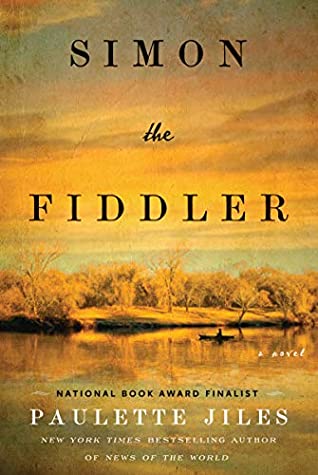
Simon the Fiddler
by Paulette Jiles
Amazon / B&N / HarperCollins
Publisher: William Morrow (April 14, 2020)
The critically acclaimed, bestselling author of News of the World and Enemy Women returns to Texas in this atmospheric story, set at the end of the Civil War, about an itinerant fiddle player, a ragtag band of musicians with whom he travels trying to make a living, and the charming young Irish lass who steals his heart.
In March 1865, the long and bitter War between the States is winding down. Till now, twenty-three-year-old Simon Boudlin has evaded military duty thanks to his slight stature, youthful appearance, and utter lack of compunction about bending the truth. But following a barroom brawl in Victoria, Texas, Simon finds himself conscripted, however belatedly, into the Confederate Army. Luckily his talent with a fiddle gets him a comparatively easy position in a regimental band.
Weeks later, on the eve of the Confederate surrender, Simon and his bandmates are called to play for officers and their families from both sides of the conflict. There the quick-thinking, audacious fiddler can’t help but notice the lovely Doris Mary Dillon, an indentured girl from Ireland, who is governess to a Union colonel’s daughter.
After the surrender, Simon and Doris go their separate ways. He will travel around Texas seeking fame and fortune as a musician. She must accompany the colonel’s family to finish her three years of service. But Simon cannot forget the fair Irish maiden and vows that someday he will find her again.
Incandescent in its beauty, told in Paulette Jiles’s trademark spare yet lilting style, Simon the Fiddler is a captivating, bittersweet tale of the chances a devoted man will take, and the lengths he will go to fulfill his heart’s yearning.
My Rating:
Favorite Quotes:
I am faithful to my friends and you can go to hell and shovel ashes.
She must take great care. Trust in God, her mother said, but never dance in a small boat.
Damon watched amazed as the man touched his hat and stood aside, but then this was the way of it when somebody carried a musical instrument, who knows why but they treat you like a woman carrying a baby. That plus a threatening glare would clear the way. Soldiers and others watched them pass with interested looks because they carried instruments and there is not a human being on earth who does not have a favorite song, lacking only somebody to play it.
He knew that he did not play music so much as walk into it, as if into a palace of great riches, with rooms opening into other rooms, which opened into still other rooms, and in these rooms were courtyards and fountains with passageways to yet more mysterious spaces of melody, peculiar intervals, unheard notes.
Pressley was a fat, pale man with slow movements and protruding eyes. He had a very deep voice that seemed to issue from him as if it had first been cast into him from somewhere else.
My Review:
I’m still contemplating and ruminating over the unusual style and approach of this book. It took me twice as long to finish as it normally would for a book of the same length. The writing style was oddly captivating, yet arduous to get through as it was laden with a staggering amount of well-researched language and items of the time, as well as intricate details of the tiniest of minutia, much of which was unfamiliar and surprisingly interesting but at other times quite tedious and laborious to wade through, and significantly slowed the storylines which progressed in accelerated bursts and slow easy starts. Yet I remained oddly intrigued and curious as to their fate throughout this slowly unfolding story.
The emotional tone was taut with tension and fraught with angst, frustration, contained rage, imminent peril, fear, thirst and hunger, yearning, intense poverty, lack of social or legal recourse, and unrelenting exhaustion. Although, slivers of clever humor sparkled among the gloom and doom of the aftermath of war and the mistreatment and abuse of power exercised over the citizens and defeated soldiers by the arrogant victors. I greatly enjoyed the pearls of wisdom and uncanny literary quotes and observations from the secondary character of Damon. What a dreadful period in history to have lived through. I am far too spoiled by my creature comforts. I require indoor plumbing, electrical current, ready transportation, and unrestricted access to the all-important major food groups – like grapes and chocolate.

About the Author

Paulette Jiles is a novelist, poet, and memoirist. She is the author of Cousins, a memoir, and the novels Enemy Women, Stormy Weather, The Color of Lightning, Lighthouse Island, and News of the World, which was a finalist for the 2016 National Book Award. She lives on a ranch near San Antonio, Texas.
Find out more about Paulette at her website.




“You can go to hell and shovel ashes” is definitely going to be my new retort when I need it. I don’t know why I love it so much. Thank you for being on this tour! Sara @ TLC Book Tours
Not my kinda read.. Ah one day Tlc might consider me a good blogger. Or maybe not… I would have to be in hell shoveling ashes by then… 😂 😂 Hopefully I am in heaven
I don’t think I’ve read a book set in this era before. Not sure it would be for me though. Great review,
the setting and time period intrigue me.. and those quotes 🙂 must remember never to dance in a small boat!
Interesting synopsis – I will definitely check this one out!
I don’t think this book would have worked for me.